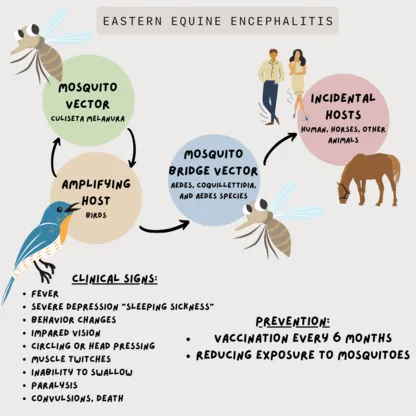Etiology
EEE is caused by a virus from the Togaviridae family. The main reservoir of the virus is birds. Mosquitos act as vectors after feeding on infected birds. The mosquitos then transmit the infectious agent to mammals while biting and feeding. Horses and humans are qualified as “dead-end” host, meaning that they cannot transmit the disease. Geographical areas containing numerous freshwater swamps are at higher epidemiological risk.
Diagnosis
EEE can be suspected when typical clinical signs occur, such as depression, fever, abnormal mentation, neurological deficits and recumbency. The clinical signs of EEE can be similar to other neurological diseases, including West Nile virus, rabies and Equine Herpes virus.
Diagnostic tests available include serology (antibody testing), cerebrospinal fluid analysis, molecular testing and viral culture.
Treatment
No specific treatment against the virus is currently available. Supportive care, such as fluid therapy, non-steroidal anti-inflammatories, protection against self-induced trauma and antibiotic therapy are often recommended. The prognosis for survival in these cases is often guarded. When horses develop neurological signs after becoming infected with the virus, the mortality rate varies between 75 to 100%. Long-term disabilities are to be expected in horses surviving the disease.
Prevention
Vaccination is very efficacious if done properly. Repeat vaccinations are required for young animals in order to build adequate immunity. Horses should be vaccinated several months prior to the mosquito season in order to obtain protective immunity against the disease. In certain regions where mosquito’s season is prolonged, vaccination is required 2-3 times annually. Mares should be vaccinated a month before foaling to provide adequate immunity to their newborn foal. Please consult with your veterinarian to ensure that your horse is protected against EEE.
To reduce the odds of being infected by mosquitos, using insecticides, screening stalls and fly sheets can be attempted. However, those strategies are unlikely to protect your horse in endemic areas and vaccination is still recommended.

